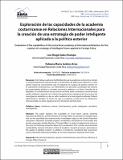| dc.contributor.author | Jenkins Arias, Fabiana María | |
| dc.contributor.author | Salas Ocampo, Luis Diego | |
| dc.date.accessioned | 2020-08-04T19:36:36Z | |
| dc.date.available | 2020-08-04T19:36:36Z | |
| dc.date.issued | 2016-06 | |
| dc.identifier.issn | 2215-2997 | |
| dc.identifier.other | https://www.revistas.una.ac.cr/index.php/abra/article/view/8361/9405 | |
| dc.identifier.uri | http://hdl.handle.net/11056/17802 | |
| dc.description.abstract | Este trabajo explora la factibilidad de que la academia costarricense donde se imparte Relaciones Internacionales y el Ministerio de Relaciones Exteriores y Culto genere inputs de conocimiento que se traduzcan en outputs de política exterior en el subsistema Centroamérica. Los informantes son personal coordinador de carreras de universidades públicas y privadas, personal académico y el Señor Canciller de la República. Si se desea iniciar una acción en esta línea, debe comenzarse con el tema de medio ambiente, mejorarse los criterios de pertinencia y relevancia de los procesos de investigación académica, y dar un salto cualitativo a la investigación aplicada. Deberá administrarse, también, el hecho de que la academia costarricense en Relaciones Internacionales no tiene experiencia en la formación de think tank | es_ES |
| dc.description.abstract | This paper explores the possibility of Costa Rican schools teaching International Relations and the Ministry of Foreign Affairs to generate knowledge input that can be translated into external policy knowledge output in the Central American subsystem. Informants included program coordinators and professors from public and private universities and the Minister of Foreign Affairs. In order to implement an action in this area, the following should be taken into consideration: first consider environmental sustainability, improve relevance criteria of academic research processes, and improve the quality of applied research. In addition, it should be considered that Costa Rican
schools that teach International Affairs do not have experience teaching Think Tanks. | es_ES |
| dc.description.sponsorship | Universidad Nacional, Costa Rica | es_ES |
| dc.language.iso | spa | es_ES |
| dc.publisher | Editorial de la Universidad Nacional | es_ES |
| dc.rights | Acceso abierto | es_ES |
| dc.rights.uri | http://creativecommons.org/licenses/by-nc-sa/4.0/ | * |
| dc.source | Revista ABRA Vol. 36, No. 52, p. 1-26 | es_ES |
| dc.subject | ACADEMIA | es_ES |
| dc.subject | SISTEMA | es_ES |
| dc.subject | CENTROAMÉRICA | es_ES |
| dc.subject | PODER INTELIGENTE | es_ES |
| dc.subject | CANCILLERÍA | es_ES |
| dc.subject | INVESTIGACIÓN | es_ES |
| dc.subject | EDUCATIONAL INSTITUTIONS | es_ES |
| dc.subject | SYSTEM | es_ES |
| dc.subject | CENTRAL AMERICA | es_ES |
| dc.subject | SMART POWER | es_ES |
| dc.subject | MINISTRY OF FOREIGN AFFAIRS | es_ES |
| dc.subject | RESEARCH | es_ES |
| dc.title | Exploración de las capacidades de la academia costarricense en Relaciones Internacionales para la creación de una estrategia de poder inteligente aplicada a la política exterior | es_ES |
| dc.title.alternative | Evaluation of the capabilities of the Costa Rican academy of International Relations for the creation of a strategy of Intelligent Power applied to Foreign Policy | es_ES |
| dc.type | http://purl.org/coar/resource_type/c_6501 | es_ES |
| dc.description.procedence | Escuela de Sociología | es_ES |
| dc.identifier.doi | https://doi.org/10.15359/abra.36-52.6 | |


